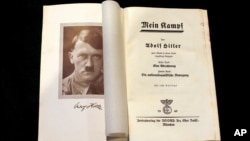Annotated reprints of Adolf Hitler's notorious book Mein Kampf (My Struggle) are set to hit German and other bookstores next week as the copyright to the book expires in 2016.
Plans to publish Hitler's partly autobiographical political manifesto have sparked debate about whether it is right to reprint the anti-Semitic work. Some scholars say it is important to issue a correctly annotated version before neo-Nazis publish their own and use it as propaganda. The debate is especially lively in Israel, where the book is taboo.
For 70 years, the German state of Bavaria has held the copyright to Hitler's book, refusing anyone the rights to publish it out of respect for victims of the Nazis. But Friday, the work entered public domain, and some German and French publishers already have prepared reprints to go on sale soon. Many others are expected to follow.
Some scholars say the 800-page book should be demystified.
Dan Michman, of the Yad Vashem International Institute for Holocaust Research, said, “Mein Kampf is an important book because Hitler had a lot of time writing and phrasing it, so it has basic ideas from his thoughts, of which parts were implemented and other parts not. But even the parts that were not implemented have importance, to understand the background in which he grew.”
Banned in some locations
In some countries, reprints and sales of Mein Kampf are banned. The book is easily available in Japan, India and Brazil, as well as in the United States. Attempts to publish it widely in Israel have failed so far, but a shortened version in Hebrew is available in Israeli universities.
“Already during the 1980s there was an initiative by a holocaust survivor [Dan Yarn] who worked in the Tel Aviv municipality to translate the book, or at least parts of it, in order for it to reach the Israeli public, because to speak about something without reading the source was wrong in his view, so he sat down and translated it," Michman said.
Some Jews protest any new publications of Hitler's anti-Semitic diatribe, while others see reason in offering a scholarly version.
One Jerusalem resident, Nathan Oddenheimer, said, "With the end of copyright on Mein Kampf, there certainly is a danger of improper use, but I think that the right way to approach such things is really to learn this book, learn what happened, without fear of censorship. These things need to be approached by creating a counterculture strong enough to defeat a negative impact."
Mein Kampf outlines Hitler's ideology and is considered the basis of his politics of National Socialism. He wrote it in a Bavarian prison while serving a sentence for treason after his failed 1923 putsch in Munich.







